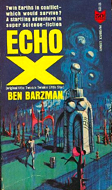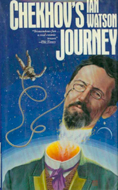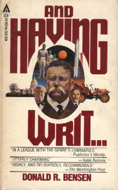


It is rather hard to believe, but by pure chance the last three novels I read in sequence were all Metahistorical narratives - not in the sense of Hayden White or Gaian ecology… What I am referring to in the case of these three books is a Metahistory as a condition, or perhaps even a technique, for examining the inter-locking possible “worlds” which are branching off from one another at pivotal moments, like fractals in space-time. This may seem like a rather typical science fiction trope - that of parallel universes or multiple simultaneous dimensions - but strangely enough, the device was used in all three of these books in a particular way, which was to provide a narrative arc for the characters to experience another world the way things might have been, but weren’t, in their own worlds. Let me take them in the order that I read them, to explain.
Purely by chance, I picked up a copy of Echo X [1960] from Filthy Pierre‘s freebie table at Boskone. To be honest, I was mostly attracted by the Jack Gaughan cover, which didn’t prepare me at all for the post-WWII narrative, which seemed like a hybrid of Catch-22 and SF. The story has been very well summarized by Keith Graham, and goes briefly as follows:
A Canadian reporter’s life was deeply scarred by his experiences in the war. He was part of a bombing mission that struck the home-town of his first lover in Southern France; his best friend was killed by flak during another mission; his attempt to help a girl whose family was killed during the blitz in London turns into a complex, life-long relationship. As an ex-pat after the war, the reporter falls in love with the girl from London, (who in the meantime has grown up to become a leading scientist,) and they both get involved in experimental research with Dr. Morescu, yet another brilliant, but tragic survivor of the recent war.
The experiments succeed in opening up a channel to a parallel world, a near-duplicate of our own Earth, except that WWII never happened. Not only did his best friend survive on the alternate Earth, but the “parallel” best friend arrives on a reconnaissance mission, along with “parallel” duplicates of both the narrator and his girlfriend, the scientist. In the course of the novel, the horrors of war, and the social injustices of our Earth are laid bare, and the reporter is placed in the difficult - perhaps impossible - position of trying to defend his own Earth, while at the same time being deeply critical of it himself. Only by hiding the stark realities and evils of his own world could he succeed in convincing the parallel Earth to open up long-lasting ties and to share their superior technologies and social norms, which are free from war, from inequality, and where political harmony was established between the nations and people of the world.
Echo X is an interesting, wonderful book, with a style reminiscent of Joseph Heller or Kurt Vonnegut. What I’m calling the metahistorical aspect of this book is seen in the way that our own Earth’s history is held up for direct comparison with a parallel Earth. The prospect of revolutionary change, should our Earth be deemed “worthy,” is the means of bringing the benefits of one dimension across to another. The characters of the book are also metahistorical actors, in that the “parallel” versions of the narrator and his paramour, get mixed up with one another in the sack. The consequences of these inter-dimensional affairs provide the emotional conclusion, while the larger metahistorical possibilities of inter-dimensional relations are never resolved.
The mixed results (apparently good on a personal level, but ambiguous, quite possibly dooming the Earth to more wars and suffering on another) are left by the narrator as an enigma for the world to decide. Like a dozen roses that shall never fade, the anonymous narrator, concludes his “hastily” written account, and leaves it for posterity to see if his observations remain attractive or meaningful. It’s a personal story, and one wonders how much of the author, Ben Barzman, is not embodied in the Canadian reporter. Surely the social commentary and anti-war slant of the book draw directly from Barzman’s life and political activities, and the similarities increase when we take into account that Barzman fled the Hollywood blacklists with his wife, Norma, to live as an ex-pat in Paris.
After Echo-X, I happened to crack open Chekhov’s Journey [1980], by Ian Watson. In alternating chapters, it becomes apparent that the story is taking place in three different worlds, or time streams, and that some sort of convergence is inevitable. The “contemporary” track involves a film project that has gone to Siberia in order to isolate themselves and to conduct a sort of psychological / hypnosis experiment. The experiment involves inducing a transference of the author Anton Chekhov’s personality onto the lead actor, Mikhail, in order to recreate the journey that Chekhov took to Siberia in 1890.
The second track involves the historical Anton Chekhov, as he travels into the hinterlands of Siberia. Slowly, Chekhov’s journey begins to morph from the “historical facts” and to become a parallel history. In that alternate 1890, Chekhov encounters Baron Nikolai Vershinin, who is obsessed with the strange comet that was reported to have exploded over Tunguska in 1888. Bankrolled by the strident and promiscuous widow, Countess Zelenina, and joined by the young genius, Konstantin Tsiolkovsky, the “historical” track sets off to explore the impact zone of Tunguska. The warping of “facts” in this second track is unknown to its characters, but is known and discussed among the “contemporary” track actors, whenever Mikhail snaps out of his hypnotic trance. Therefore, the discrepancy of the 1888 explosion and the “real” event that occurred in Tunguska in 1908, becomes a subject of discussion for the “contemporary” track characters.
A third, “future” track unfolds when the experimental interstellar spaceship, K. E. Tsiolkovsky, is about to engage it’s flux drive for the first time under the leadership of Commander Anton Astrov. In this scenario, the super-advanced Soviet Union is preparing to launch an interstellar space probe, and a jealous United States is poised to interfere with the flux engines at the moment of ignition. Consequently, the flux drive fails to engage properly and the unlucky crew is sent plummeting into a space-time warp. Aware of their own historical “facts,” the crew of the ship tries desperately to bring the flux drive back under control in time to escape the Earth’s atmosphere and to avoid burning up in a huge fireball. Of course, as it turns out, their trajectory puts them on a collision course with Tunguska, Siberia. But the “oddity” is that their calculations indicate a temporal impact of the year 1888, instead of 1908, when they should have arrived!
Watson’s ingenious plotting, action, and characters make Chekhov’s Journey worth reading multiple times. And Watson effortlessly manages to weave a metahistorical narrative out of the tension and discrepancies that appear between the historical, contemporary, and future tracks. An altogether great achievement!
It was with a rather skeptical outlook that I started to read And Having Writ, by Donald Bensen, something I bought from the Mind’s Eye stacks at Arisia. There is no indication on the jacket copy, but it turns out that the book is: “a smoothly humorous sf novel set in an alternate world engendered by the survival of the aliens whose crash-landing caused the Siberian Tunguska explosion of 1908.” John Clute
This was a rather mind-boggling coincidence having just put down Chekhov’s Journey, to say the least!
But even more intriguing was the metahistorical threads holding the book together. Indeed, one of the alien visitors, is a trained “Metahistorian.” In the novel this profession studies of the deep trends of society from which there are inevitable consequences, and therefore it is Metahistorian who is expected to have the keenest understanding of any alien culture. That being said, the “Metahistorian” in And Having Writ seems more like a cross between futurologist and anthropologist, as we commonly used those terms in the 1970s.
In my view, the fascinating aspects of Bensen’s novel had to do with the subtle distortions of “historical facts” that creep into view. In the first case, their direct impact with Earth (apparently the true “cause” of the Tunguska explosion) is narrowly avoided by the alien Integrator, who is the crew member who can see and manipulate the “patterns” of the Universe and living beings. Then, in their various dealings and encounters with Teddy Roosevelt, H.G. Wells, Thomas Edison, King Edward VII, the Wright Brothers, and a host of other characters, the alien visitors manage to introduce ideas or subtle changes into the “real” world that cause it to metamorphose into a “different” world. The cheerful and seemingly careless way in which the naive aliens encounter famous figures of their day is quite amusing, and keeps the pace of the book moving crisply.
Later in the story, after the Metahistorian’s scheme has apparently hopelessly failed - he intended to expedite WWI in order to jump-start a technological revolution which would help them to repair their spaceship - the aliens become bored and decide to go into a stasis mode and await more hopeful eventualities in the far future. They are surprised to be revived a mere 17 years later [the quasi-year 1933], to find that the world not only avoided war but went into a technological hyper-rennaissance. Their spaceship has been repaired and they are sent back on their exploration of the stars by a completely changed and more harmonious human race. However, the clever conceit of the conclusion is that the “trick” that the Integrator used to prevent them from exploding over Siberia not only saved their lives, but also “branched” them into an alternate Universe. That explains why the Metahistorian’s predictions were incorrect, because they were based on what should have happened in the alternate Universe, not what actually happened in their current manifestation.
This produced a cozy feeling when I read it. Certainly, I would rather like to think that the inevitability of the savagely stupid reality of my current world - a planet laid waste by greedy capitalist corporations and blood-thirsty psychopaths - can simply branch off into a better alternate Universe! Indeed, why can’t any catalyzing instance create this alternate dimension? That, for me at least, is a heart-warming thought. Although physicists theorize them, science fiction authors instantiate them, and spiritualists seek to manifest them, there is no proof of such crossing paths of alternate universes…but that doesn’t mean it can’t happen!
So it goes, as Kurt Vonnegut always said. Isn’t it a fine indicator to have the synchronicity of these three novels falling into my hands randomly, one after the other? Well, I will take as a fine, in any case.
-Merrick Lex Berman